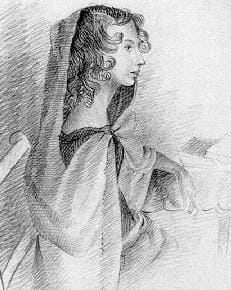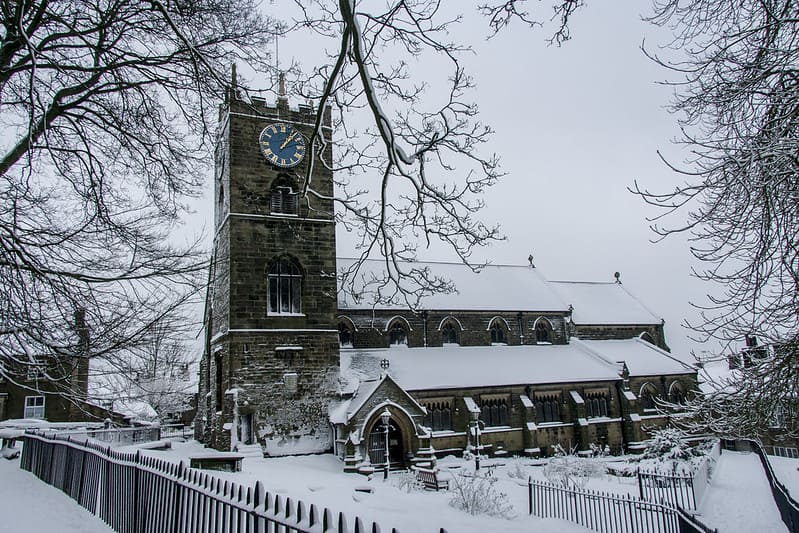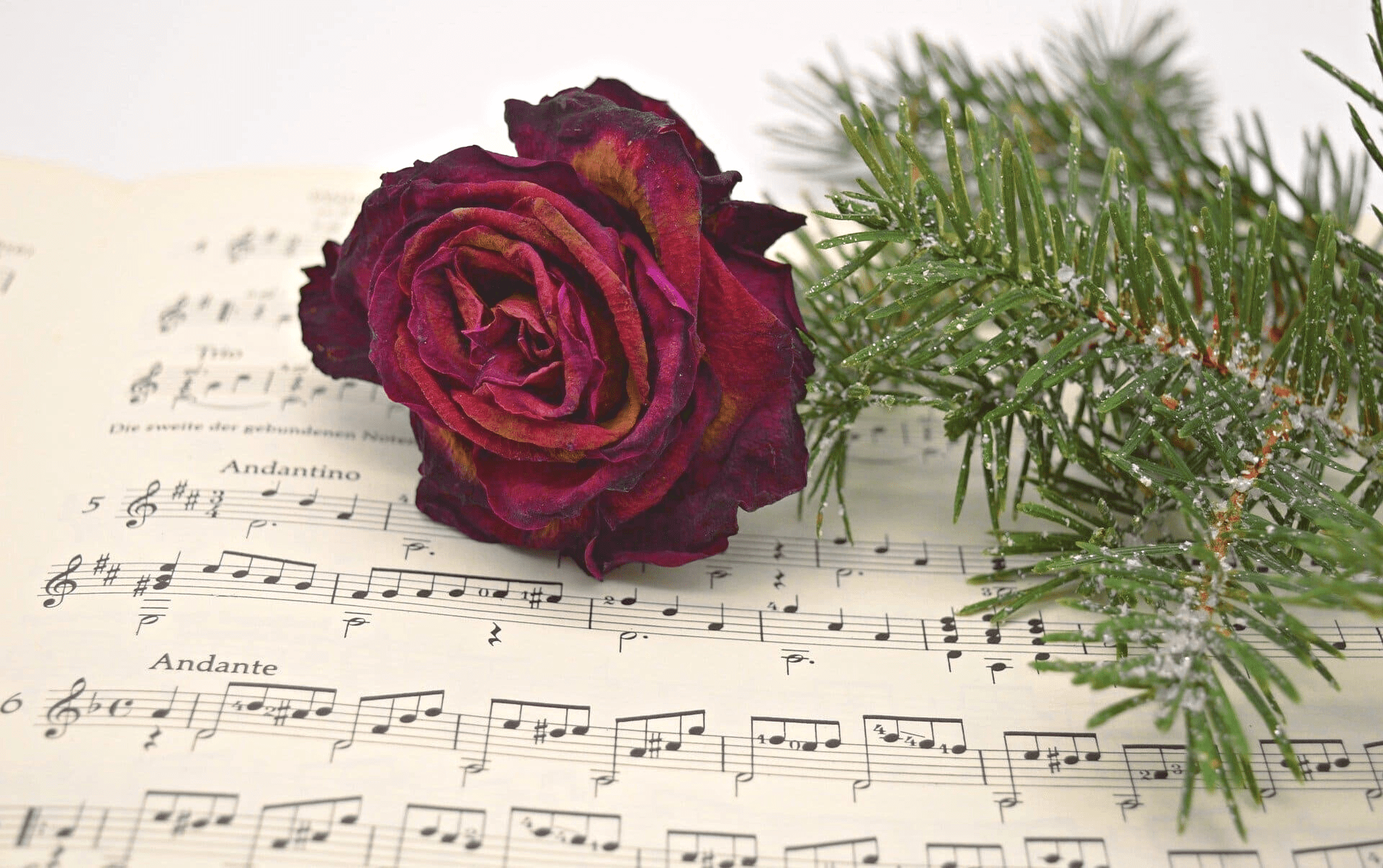In the days approaching Christmas, my thoughts have turned to some of the Christmas Carols (songs sung at Christmas) and the stories behind how they were written.
If you have ever spent the Christmas season in an English-speaking country such as Britain or Ireland, chances are that you have heard a Christmas carol being sung even on the streets (at least before Covid-19). 
Then there are other poets and writers who penned (wrote) carols or Christmas poems that sadly are not as well-known even though they are as good!
One such poem is that by Anne Bronte, the youngest of the famous Bronte sisters.

Drawing in pencil by Charlotte Brontë, c. 1834.
Public domain, via Wikimedia Commons
Today we will look at her poem ‘Music on Christmas Morning’ which she probably wrote in the mid-1840s (it is difficult to accurately date when it would have been written, as it was published alongside her sisters’ poems in their first book together in 1846).
It has been a while since we last read a poem line-by-line, analysed its vocabulary, and reflected on its meaning. What could be better than to take the time to do so in our final Lesson of the year!
You will find here:




…

Music I love–but never strain
Could kindle raptures so divine,
So grief assuage, so conquer pain,
And rouse this pensive heart of mine–
As that we hear on Christmas morn,
Upon the wintry breezes borne.
Though Darkness still her empire keep,
And hours must pass, ere morning break;
From troubled dreams, or slumbers deep,
That music kindly bids us wake:
It calls us, with an angel’s voice,
To wake, and worship, and rejoice;
To greet with joy the glorious morn,
Which angels welcomed long ago,
When our redeeming Lord was born,
To bring the light of Heaven below;
The Powers of Darkness to dispel,
And rescue Earth from Death and Hell.
While listening to that sacred strain,
My raptured spirit soars on high;
I seem to hear those songs again
Resounding through the open sky,
That kindled such divine delight,
In those who watched their flocks by night.
With them, I celebrate His birth–
Glory to God, in highest Heaven,
Good-will to men, and peace on Earth,
To us a Saviour-king is given;
Our God is come to claim His own,
And Satan’s power is overthrown!
A sinless God, for sinful men,
Descends to suffer and to bleed;
Hell must renounce its empire then;
The price is paid, the world is freed,
And Satan’s self must now confess,
That Christ has earned a Right to bless:
Now holy Peace may smile from heaven,
And heavenly Truth from earth shall spring:
The captive’s galling bonds are riven,
For our Redeemer is our king;
And He that gave his blood for men
Will lead us home to God again.
…

1. strain: (noun) the sound of a piece of music. This is its meaning here. (However, as a verb it means: (1) to make a great, sometimes painful, effort to do something difficult or challenging; to stretch yourself to the point of feeling pain. Yet another meaning of this word in other contexts could be: (2) to pour a liquid substance through a netted device so as to hold back any solid matter and separate it from the pure liquid).
2. kindle: (verb) to arouse, fan, encourage a flame to become a fire. Also, to inspire a feeling or emotion in someone.
3. raptures: (noun, plural form) a feeling of intense, sometimes even spiritual, joy
4. divine: (adjective) relating to God
5. grief: (noun) the pain and deep sadness that one feels after losing another person, whether to death or some kind of separation
6. assuage: (verb) to lessen the intensity of a strong, unpleasant feeling. Also, to satisfy something such as an appetite or desire.
7. conquer: (verb) to overcome something or someone in a battle or fight; to become the master of something that opposed you
8. rouse: (verb) to awaken from sleep or apathy; to make someone angry or excited
9. pensive: (adjective) thoughtful, reflective, in serious or deep thought
10. morn: (noun, poetic) morning
11. breezes: (noun, plural form) light strains of wind, usually fresh and invigorating
12. borne: (as apast participle of ‘to bear’); (Adjective) carried or transported by the thing that has been mentioned.
13. empire: a huge group of countries ruled over by a single monarch or state.
14. ere: (archaic, conjunction and preposition) before
15. ere morning break: before morning dawns
16. troubled: (adjective) disturbed, restless
17. slumbers: (noun) sleep
18. deep: (adjective) very intense or extreme; extending far down
19. bids: (archaic, verb) ask or order (someone) to do something
20. wake: (verb) to emerge or cause to emerge from (come out of) sleep; stop sleeping
21. worship: (verb) to show reverence and adoration for a deity
22. glorious: (adjective) showing glory; having or being worthy of admiration; having a striking beauty or splendour
23. redeeming: (adjective) able to save people from sin, error, or evil
24. Heaven: (noun) the place where God is said to live, together with angels; also the home after death of those who lived good lives on earth. Heaven is often thought of as being above the sky.
25. dispel: (verb) to cause something to disappear
26. rescue: (verb) to save someone from a dangerous situation
27. sacred: (adjective) holy, something that should be reverenced (especially because it is seen as belonging to God
28. strain: (noun) the sound of a piece of music
29. raptured: (adjective) caught up in a rapture (experience of high joy)
30. soars: (verb) to rise high in the air, as if on powerful wings
31. resounding: (adjective) sounding again and again with strength and volume
32. delight: (noun) great joy and pleasure
33. flocks: (noun, plural form) groups of animals, especially sheep
34. celebrate: (verb) to mark an occasion or person with special rejoicing and enjoyable activities
35. glory: (noun) magnificence with great beauty and honour
36. good-will: (noun) friendly and helpful feelings and attitudes towards others
37. claim: (verb) to formally ask or demand; to say that one owns something. (It can also mean the following: to state or assert that something is the case, especially when one does not provide evidence or proof)
38. Satan: (noun) God’s enemy, the origin of evil in the world
39. overthrown: (verb) to defeat, to overcome (something or someone) violently and cause them to submit
40. sinless: (adjective) without sin (an immoral act that is against divine law)
41. sinful: (adjective) full of sin
42. descends: (verb) to move, fall, or slope downwards
43. suffer: (verb) to go through or endure pain
44. bleed: (verb) to lose blood (as through wounds or injuries)
45. hell: (noun) the opposite of heaven; the place where Satan – not God – will end up, and where all evil people will go after death.
46. renounce: (verb) formally declare that one(self) no longer has a right, claim to, or the possession of something
47. freed: (past participle of the verb ‘to free’) realised from slavery or undesirable, restrictive confinement or restraint
48. confess: (verb) to acknowledge the truth of something in words
49. earned: (past participle of the verb ‘to earn’) deserved; become worthy of something because of having paid the price for it
50. right: (noun) a claim, entitlement to do or have something
51. bless: (verb) to speak words of life and favour over someone else
52. holy: (adjective) without sin; sacred; something deserving to be honoured and revered
53. heavenly: (adjective) like heaven; extraordinarily peaceful and beautiful
54. spring: (verb) to bounce up
55. captive: (noun) someone or something that has been imprisoned, confined, or kept hostage
56. galling: (adjective) deeply hurtful or causing resentment
57. bonds: (noun, plural form) a restrictive, usually negative connection between two groups or surfaces; something that enforces a person’s slavery
58. riven: (literary and archaic) split and torn apart with violence
59. Redeemer: Christ Jesus, seen as someone who redeems (frees and saves) someone or something from something else that held them back or down (such as sin or death)
60. And He that gave his blood for men: and He that gave up his life and died to save mankind
61. lead: (verb) to guide, to move others in a good or safe direction by stepping in front of them on a path and protecting them from error or mistakes.
…

Here is a simple paraphrase of the poem’s stanzas in my own words. Please do read Anne Bronte’s poem again after reading my paraphrase of it – there is no comparison with the original, and I am only writing a paraphrase to make sure that you can enjoy her poem all the more!
I love music – but no musical melody ever
Could stir and light up intense joys that are so divine,
That calm and console grief, that conquers pain,
And heartens and encourages this thoughtful heart of mine –
No other music can do all this except for that which we hear on Christmas morning,
Carried on the wintry breezes.
Even though Darkness still rules over so much, like an empire,
And it will be many hours before the break of morning;
That music kindly asks us to wake up
From troubled dreams, or deep sleep:
It calls us, with an angel’s voice,
To wake, to worship God, and rejoice;
To greet with joy the glorious morning,
Which angels welcomed long ago,
[The morning] when our redeeming Lord (Jesus Christ) was born,
To bring the light of Heaven down to people below;
[He came] to break up and scatter the Powers of Darkness,
And to rescue Earth from the power of Death and Hell.
While I am listening to that holy musical sound,
My overjoyed spirit flies powerfully on high;
I seem to hear those songs again
Sounding again and again through the open sky,
[Music] that warmed, lit, and inspired such godly, divine delight,
In those [shepherds] who cared for their flocks by night.
Together with them, I celebrate Jesus’s birth –
Glory to God, in the highest Heaven,
Good-will to mankind, and peace on Earth,
For to us a Saviour-king has been given;
Our God has come to claim what is His own,
And Satan’s opposing, evil power is overthrown!
A sinless God, for the sake of sinful men and women,
Descended to suffer and to bleed [in our place/stead];
Hell must give up its empire then;
Because the price has been paid, the world is now freed,
And Satan himself must now confess/recognise,
That Christ has earned a right to bless:
Now holy Peace can smile from heaven,
And heavenly Trust will spring upwards from the earth;
The prisoner’s bitter chains are broken,
Because our Redeemer is our king;
And He who gave his blood (died sacrificially) for men
Will lead us home (reconcile us) to God again.
…

With them, I celebrate His birth–
Glory to God, in highest Heaven,
Good-will to men, and peace on Earth,
To us a Saviour-king is given …
Anne Bronte, like her sisters, was just as devout (devoted to God and her faith) as she was sensitive to the beauty of sweet and powerful music.

The Brontes’ father, Reverend Patrick Bronte, served as minister here (1820-1861).
Faith was of central importance in the Bronte family upbringing.
Image credit: John Sargent, via Flickr
Here are some questions you might like to reflect on:
* What feelings does your favourite music inspire you with?
* Are you drawn to (attracted by) music or art that depicts (shows) eternal themes?
* What was your favourite line in Anne Bronte’s poem, and why?

…
That brings us to the end of our Lesson, the last one of 2021! To all my English language students and readers online:








